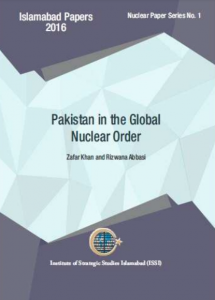-Zafar Khan and Rizwana Abbasi, Islamabad, Pakistan
The international community needs to reconsider the systemic strategic dilemma both India and Pakistan suffer from. We call this a syndrome of extra-regional link, which becomes one of the important challenges affecting the deterrence stability in South Asia. In this case, whatever strategically happens between the US and Russia, and/or between the US and China, would affect the equation between China and India. Arguably, that would then affect Pakistan. China is not engaged with the US or India in regard to arms control process, but this still has a strategic impact on South Asia.
Arms reduction and policy restraint at the top level i.e., the US and Russia including France and Britain reduce the pressure on the lower level i.e., China, India and Pakistan. Also, since major powers would like to take smaller powers on board for the arms control and disarmament processes fulfilling the pledges of the non-proliferation regime, they too would need to reduce their deterrent forces to lower levels. This would not only promote deterrence stability amongst nuclear weapons states, but also provide them incentives to address the issues related to prevailing systemic strategic dilemmas they face viz-à viz each other. However, if major powers continue to develop their deterrent forces, then this would signal to other nuclear weapons states to retain their deterrence forces. This is precisely what is happening in South Asia.
 Resolving the issue of Jammu and Kashmir between India and Pakistan:
Resolving the issue of Jammu and Kashmir between India and Pakistan:
The study argues that the Jammu and Kashmir dispute is a question related to international law, human rights, human security and regional stability. Therefore, it requires intercession of the international community and support of the leading states, such as the US, to help find a lasting solution based on aspirations of the people of Jammu and Kashmir.
Any peace process will remain fruitless unless the issue of Kashmir is addressed based on the right to self-determination. India and Pakistan have failed to resolve the issue on bilateral grounds up to now. China, in parallel, too, can help in resolving the Kashmir dispute to create peace and stability in this region, but it has its own limitations.

Sustained talks between the two nuclear adversaries are a must for maintaining a semblance of stability. In addition to periodic third party intercession, bilateral dialogue on all outstanding issues between India and Pakistan and restoration of communication are essential in the conflict-prone and nuclearized South Asian region. Track II diplomacy adds little value in the absence of official dialogue between the two states. Presence of nuclear weapons and democratic rule in both the countries can fashion a strategic and political environment conducive to consolidating and reinitiating the CBMs and building trust on shared interests and goals. In the interest of their own people and peace in the region, both sides should proactively collaborate to root out terrorism that is one of the ten-point agenda of the Comprehensive Dialogue agreed by both India and Pakistan.
Conclusion:
Pakistan developed its nuclear weapons programme for defensive purposes to address its acute security concerns viz-aviz India. Pakistan‘s nuclear weapons programme is India specific and it will continue to play a deterring role in the national security of Pakistan thwarting the possibility of both major and limited wars in South Asia.
Pakistan had a number of deterrence policy options, but it deliberately opted for the credible minimum deterrence considering its domestic security compulsions.
Although ambiguity plays a central role in its nuclear weapons programme and policy, Pakistan continues to pursue a policy of producing a smaller number of deterrent forces with no interest in weapon-to weapon arms race strategy. It aims to sustain ―balance rather than ―parity and does not want to be part of an unending arms race.
In addition to the recent Carnegie-Stimson report that presumes that Pakistan could become the world‘s third largest nuclear weapons state in 10 years, there still exists a fear in the international community that Pakistan‘s nuclear weapons might fall in the wrong hands. These worries are based upon flawed assumptions and overlook the extensive investments Pakistan has made towards nuclear security and its immaculate trace record, despite being a frontline U.S. ally in the war on terror. Pakistan institutionalized its nuclear weapons programme immediately after its nuclear tests. It successfully created the NCA and built the SPD as its secretariat to ensure the safety and security of all its deterrent forces and related facilities under a centralized and robust command and control system. In fact, India has followed some of Pakistan‘s unilateral actions aimed at enhancing nuclear responsibility, transparency and developing an effective NCA.
Domestically, Pakistan has commendably worked to improve its legal order, fight terrorism in its all forms and manifestations, create a rigorous export control regime and construct a nuclear security regime. Regionally, it is ready to work on these parametres with other countries. Internationally, Pakistan follows the United Nations Security Council Resolution 1540. It is a party to the Convention on Nuclear Safety, the Convention on the Physical Protection of Nuclear Materials and Global Initiative to Combat Nuclear Terrorism, the Container Security Initiative, and the IAEA‘s Incident and Trafficking Database. Moreover, Islamabad has established its independent regulatory authority ─ PNRA ─ that closely works with the IAEA. Other important institutions such as Pakistan‘s National Centre of Excellence,
Pakistan‘s Engineering and Applied Sciences and the School for Nuclear and Radiation Safety provide world-class training and specialization in the field of nuclear security and radiation safety. Also, Pakistan has been an active participant in the Nuclear Security Summit that has been held every two years since 2010. The international community now acknowledges these institutionalized efforts that make Pakistan a responsible nuclear weapons state.
Pakistan‘s consistent diplomatic stance on the proposed FMCT does not mean that Pakistan would necessarily increase its deterrent forces. The world‘s largest chunk of nuclear weapons and their related materials are still with the US and Russia. Despite not being a part of the NPT and a non-signatory to the CTBT, Pakistan unilaterally and voluntarily maintains a moratorium on nuclear testing, has a modest number of deterrent forces, follows credible minimum deterrence, keeps nuclear weapons for defensive purposes only and accepts the internationally verifiable, non-discriminatory and criteria-based non-proliferation endeavors. The international community largely misperceives Pakistan‘s declaratory statement of full spectrum deterrence by associating it with the bigger numbers. Full spectrum deterrence falls within the broader contours of Pakistan‘s credible minimum deterrence, that is, to deter all forms of aggression.
The international community should not overlook the gradually changing South Asian strategic environment such as India‘s Cold Start Doctrine, its development of non-strategic battlefield weapons, and its strides for an assured second-strike capability in the form of nuclear submarines, its known and unknown nuclear facilities/reactors outside the IAEA safeguards and establishment of secret-city project in Karnataka. The development of ICBMs, MIRVs and BMD system has further accentuated strategic instability in South Asia.
The changed strategic environment in South Asia puts a greater pressure on Pakistan to upgrade and streamline its deterrent in order to sustain deterrence stability and avert a war.
 The recommendations we have made would help the international community understand the vantage point of the nuclear strategy of Pakistan, mainstream Pakistan in the international nuclear order, and build peace in South Asia. These recommendations underline the importance of normalizing the international nuclear order on the basis of generally acceptable criteria; regulating India‘s emerging nuclear modernization by addressing the growing conventional force asymmetry; addressing the issues that hinder arms control by India and Pakistan; re-considering the strategic dilemma facing South Asia; and resolving the disputes between India and Pakistan.
The recommendations we have made would help the international community understand the vantage point of the nuclear strategy of Pakistan, mainstream Pakistan in the international nuclear order, and build peace in South Asia. These recommendations underline the importance of normalizing the international nuclear order on the basis of generally acceptable criteria; regulating India‘s emerging nuclear modernization by addressing the growing conventional force asymmetry; addressing the issues that hinder arms control by India and Pakistan; re-considering the strategic dilemma facing South Asia; and resolving the disputes between India and Pakistan.
All the above-mentioned measures are interlinked with the role of major states mainly the US. Problems within the international nuclear order are not because of Pakistan. Major Powers ‘double standards ─ application of more stringent rules towards one state and a lax approach towards other ─ have made it skewed. Trust and cooperation have been lacking due to nonfulfillment of the powerful states ‘commitments to Article VI of the NPT. The implementation of the proposals made in the paper may help strengthen non-proliferation norms, promote peace, and prevent the use of nuclear weapons in South Asia and support peaceful uses of nuclear technology. Also, it is important for India and Pakistan to rationalize their military plans under some budgetary regime and decide how much is adequate to secure peace, stability and development in South Asia.
# Text courtesy: Pakistan in the Global Order, Islamabad papers ( Nuclear Paper series 1).
Concluded: Ed. Upadhyaya.
